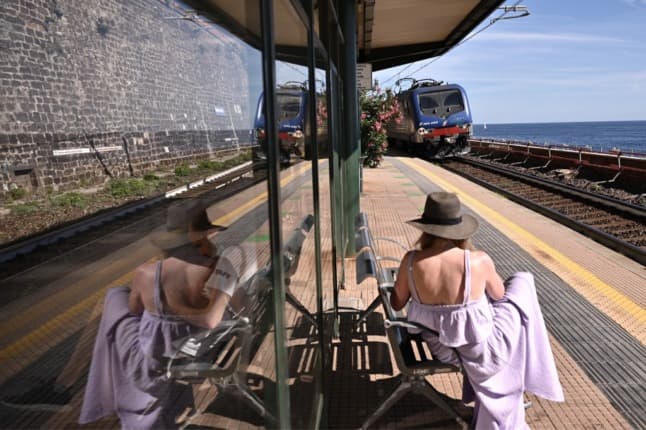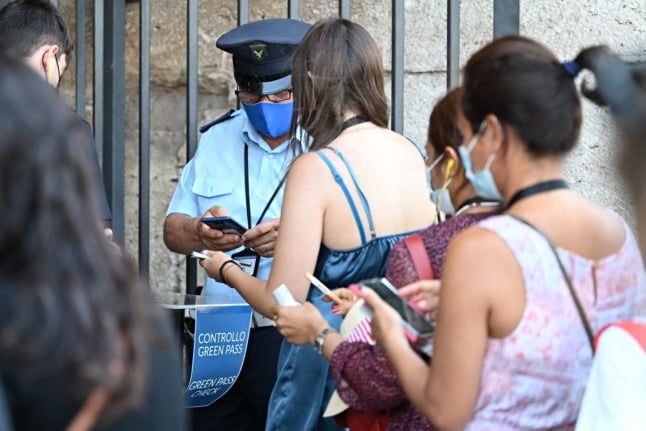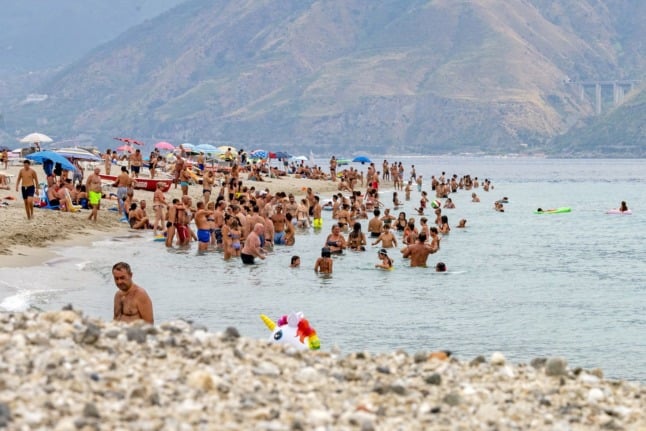What changes for tourists coming to Italy in September?

Rules for travel to and within Italy have changed in response to the developing coronavirus situations in different parts of the world and inside the country. Here are the major changes for tourists visiting in September.
On Tuesday, the Italian Ministry of Health's new travel ordinance came into force, tightening restrictions on travel from some countries, and lifting them for others.
New restrictions on passengers from the US, Canada, Japan and Israel
Travellers from these countries will now need to quarantine for five days upon entering Italy unless they can produce a certificate from their local health authority showing that they have been fully vaccinated for at least 14 days or have recovered from Covid in the last 180 days, and a negative PCR or antigen test taken in the 72 hours before their arrival.
Travellers who only produce one of these items will be subject to quarantine requirements. All those required to quarantine will also have to take a test as soon as their isolation period ends.
READ ALSO: What are the new rules for travel to Italy from the US and Canada?
This represents a tightening of restrictions, as previously passengers from these countries were only required to present a vaccination or recovery certificate or a negative test result in order to avoid quarantining.
Any travellers who have passed through these countries in the past 14 days will be subject to the same requirements, even if they are travelling from a Schengen zone country.

Photo: ANSA/AFP
Quarantine lifted for vaccinated UK arrivals
For the first time since June, passengers from the UK will not be required to quarantine upon their arrival in Italy, if they can produce a certificate of vaccination showing the holder has been fully vaccinated for at least 14 days. In this instance, proof of recovery from Covid-19 in the past six months is not accepted.
Travellers will also need to take a molecular PCR or rapid antigen test in the 48 hours before their arrival in the country.
Q&A: Answers to your questions about Italy’s new travel rules
Arrivals without a vaccination certificate will continue to be subject to a five-day self-isolation period, following which they will need to take a test.
Anyone who has transited through the UK in the past 14 days is subject to the same requirements.
Green pass required for long-distance public transport
As of September 1st, all passengers travelling via interregional trains, buses, ferries and domestic flights will be required to produce a Covid 'green pass' or health pass.
The Strait of Messina ferry route, which connects Sicily with mainland Italy, is considered a local public transport route and is exempted from the requirement, according to the Italian news site Avvenire.
Proof of vaccination, testing or recovery via the certificazione verde or ‘green pass’ scheme has been required since August 6th in order to enter many cultural and leisure venues across Italy.

Photo: Andreas SOLARO / AFP
That includes: indoor bars and restaurants, though only if you’re sitting inside; museums; theatres, cinemas and concert venues, including outdoors; gyms; indoor swimming pools; wellness centres and spas; theme parks; conferences and trade fairs; bingo halls and casinos, and more. Find the official list here (in Italian).
Children under 12 are exempt from the ‘green pass’ requirement.
Italy recognises all equivalent health passes from other EU countries and proof of immunisation issued from any of these five non-EU countries, including on paper.
That means visitors just need to carry the official proof of vaccination issued by your home country, such as a CDC-approved vaccination card from the US, a provincial immunisation card from Canada or an NHS vaccination certificate from the UK.
If you do not have a pass from one of these countries and plan on using public transport or going to a venue or event in Italy that requires a green pass, you will need to get tested in Italy (or elsewhere in the EU) in order to claim a certificate that remains valid for 48 hours.
The Italian health pass can be obtained by taking a rapid antigen or PCR test in Italy. The certificate comes in a standardised format with a QR code, so that it can be quickly scanned and verified.
READ ALSO: Q&A: Your questions answered about Italy’s Covid health pass
Sicily in 'yellow' zone
As of August 30th, Sicily was placed under yellow zone restrictions as new weekly cases and Covid hospitalisation rates rose. It is currently the only Italian region that does not have the least- restricted 'white' zone status.
Yellow zone restrictions require that masks are worn in all public spaces, including outdoors, and that restaurants may only seat a maximum of four people per table (unless the group is co-habiting) though indoor dining is allowed, according to the Health Ministry.
However there is no evening curfew, and travel between Sicily and other Italian regions is not restricted.

Photo: Giovanni ISOLINO/AFP
There are also four municipalities within Sicily that have higher level 'orange' zone restrictions: Barrafranca, Niscemi, Comiso, and Vittoria. These areas have a 10pm-5am curfew, and gyms, swimming pools, theatres and cinemas are closed, while bars and restaurants may only serve take-out food and drink.
Calabria and Sardinia are the two other Italian regions currently considered most at risk of being placed into yellow zone. Both regions exceed two out of three of the government's thresholds for remaining in the low-restriction white zone: coronavirus infection incidence rate, hospitalisations and intensive care occupancy.
Comments (2)
See Also
On Tuesday, the Italian Ministry of Health's new travel ordinance came into force, tightening restrictions on travel from some countries, and lifting them for others.
New restrictions on passengers from the US, Canada, Japan and Israel
Travellers from these countries will now need to quarantine for five days upon entering Italy unless they can produce a certificate from their local health authority showing that they have been fully vaccinated for at least 14 days or have recovered from Covid in the last 180 days, and a negative PCR or antigen test taken in the 72 hours before their arrival.
Travellers who only produce one of these items will be subject to quarantine requirements. All those required to quarantine will also have to take a test as soon as their isolation period ends.
READ ALSO: What are the new rules for travel to Italy from the US and Canada?
This represents a tightening of restrictions, as previously passengers from these countries were only required to present a vaccination or recovery certificate or a negative test result in order to avoid quarantining.
Any travellers who have passed through these countries in the past 14 days will be subject to the same requirements, even if they are travelling from a Schengen zone country.

Quarantine lifted for vaccinated UK arrivals
For the first time since June, passengers from the UK will not be required to quarantine upon their arrival in Italy, if they can produce a certificate of vaccination showing the holder has been fully vaccinated for at least 14 days. In this instance, proof of recovery from Covid-19 in the past six months is not accepted.
Travellers will also need to take a molecular PCR or rapid antigen test in the 48 hours before their arrival in the country.
Q&A: Answers to your questions about Italy’s new travel rules
Arrivals without a vaccination certificate will continue to be subject to a five-day self-isolation period, following which they will need to take a test.
Anyone who has transited through the UK in the past 14 days is subject to the same requirements.
Green pass required for long-distance public transport
As of September 1st, all passengers travelling via interregional trains, buses, ferries and domestic flights will be required to produce a Covid 'green pass' or health pass.
The Strait of Messina ferry route, which connects Sicily with mainland Italy, is considered a local public transport route and is exempted from the requirement, according to the Italian news site Avvenire.
Proof of vaccination, testing or recovery via the certificazione verde or ‘green pass’ scheme has been required since August 6th in order to enter many cultural and leisure venues across Italy.

That includes: indoor bars and restaurants, though only if you’re sitting inside; museums; theatres, cinemas and concert venues, including outdoors; gyms; indoor swimming pools; wellness centres and spas; theme parks; conferences and trade fairs; bingo halls and casinos, and more. Find the official list here (in Italian).
Children under 12 are exempt from the ‘green pass’ requirement.
Italy recognises all equivalent health passes from other EU countries and proof of immunisation issued from any of these five non-EU countries, including on paper.
That means visitors just need to carry the official proof of vaccination issued by your home country, such as a CDC-approved vaccination card from the US, a provincial immunisation card from Canada or an NHS vaccination certificate from the UK.
If you do not have a pass from one of these countries and plan on using public transport or going to a venue or event in Italy that requires a green pass, you will need to get tested in Italy (or elsewhere in the EU) in order to claim a certificate that remains valid for 48 hours.
The Italian health pass can be obtained by taking a rapid antigen or PCR test in Italy. The certificate comes in a standardised format with a QR code, so that it can be quickly scanned and verified.
READ ALSO: Q&A: Your questions answered about Italy’s Covid health pass
Sicily in 'yellow' zone
As of August 30th, Sicily was placed under yellow zone restrictions as new weekly cases and Covid hospitalisation rates rose. It is currently the only Italian region that does not have the least- restricted 'white' zone status.
Yellow zone restrictions require that masks are worn in all public spaces, including outdoors, and that restaurants may only seat a maximum of four people per table (unless the group is co-habiting) though indoor dining is allowed, according to the Health Ministry.
However there is no evening curfew, and travel between Sicily and other Italian regions is not restricted.

There are also four municipalities within Sicily that have higher level 'orange' zone restrictions: Barrafranca, Niscemi, Comiso, and Vittoria. These areas have a 10pm-5am curfew, and gyms, swimming pools, theatres and cinemas are closed, while bars and restaurants may only serve take-out food and drink.
Calabria and Sardinia are the two other Italian regions currently considered most at risk of being placed into yellow zone. Both regions exceed two out of three of the government's thresholds for remaining in the low-restriction white zone: coronavirus infection incidence rate, hospitalisations and intensive care occupancy.
Join the conversation in our comments section below. Share your own views and experience and if you have a question or suggestion for our journalists then email us at [email protected].
Please keep comments civil, constructive and on topic – and make sure to read our terms of use before getting involved.
Please log in here to leave a comment.